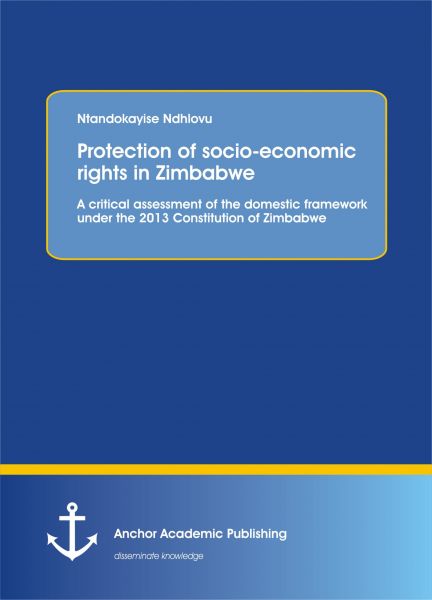Protection of socio-economic rights in Zimbabwe. A critical assessment of the domestic framework und
Socio-economic inequality is deeply rooted in Zimbabwe due to a number of factors. One of the main factors is the exclusion of socio-economic rights as justiciable under the now repealed Lancaster House Constitution (LHC). A plethora of excessive bureaucratic actions in a number of instances left many people stranded without the recourse to the law, particularly without protection by the Constitution. To correct this historic anomaly, the 2013 Constitution was enacted. The 2013 Constitution protects both civil and political rights and socio-economic rights in the same way as justiciable rights. This provides the highest degree of interdependence and interrelatedness of all rights in the domestic legal order.
In order to ensure that socio-economic rights are effectively protected and enforced, this study identifies and discusses the framework for protecting socio-economic rights under the 2013 Constitution. Firstly, the specific rights protected under the Constitution and the obligations imposed by these rights are presented. Secondly, the role of the courts in the protection of socio-economic rights is discussed. Further, some of the major conceptual and practical challenges that are likely to arise in the adjudication of socio-economic rights are identified. In this regard, the study attempts to present solutions meant to overcome the conceptual and practical challenges that are faced in the enforcement of socio-economic rights. Furthermore, this study argues that strictly adopting one of the two models of review, namely either the reasonableness approach as adopted by South African courts or the minimum core approach as expounded by the United Nations Committee on Economic Social and Cultural Rights (CESCR), will inhibit the proper enforcement of the protected rights. Therefore, courts should consider adopting an integrated model that includes both approaches to ensure that socio-economic rights are effectively protected and realised.
Versandkostenfreie Lieferung! (eBook-Download)
Als Sofort-Download verfügbar
- Artikel-Nr.: SW9783960675525
- Artikelnummer SW9783960675525
-
Autor
Ntandokayise Ndhlovu
- Verlag Anchor Academic Publishing
- Seitenzahl 96
- Veröffentlichung 15.06.2016
- ISBN 9783960675525

